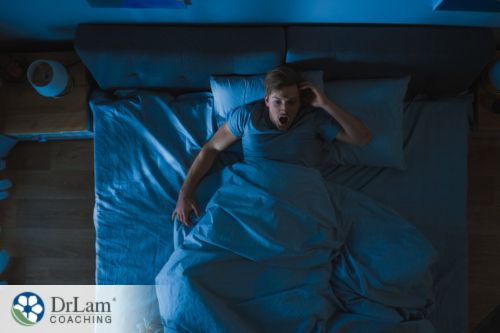Dementia and nightmares are both undesirable conditions all on their own. And new research shows there may be an unlikely relationship between the two.
A study on sleep issues and dementia shows that adults with more nightmares and bad dreams may be several times more likely to develop dementia. But what could cause this link? And is there anything you can do to lower your risk factors?
 Dementia is a broad term that describes a group of symptoms associated with cognitive decline, memory loss, and also a decline in communication skills. The term covers a wide range of specific medical conditions, including Alzheimer’s disease, vascular dementia, Lewy body dementia, and frontotemporal dementia.
Dementia is a broad term that describes a group of symptoms associated with cognitive decline, memory loss, and also a decline in communication skills. The term covers a wide range of specific medical conditions, including Alzheimer’s disease, vascular dementia, Lewy body dementia, and frontotemporal dementia.
The primary cause of dementia is damage to the nerve cells and their connections in the brain. This damage impairs the brain cells’ capacity to communicate with one another, which then hampers communication, thoughts, and behavior. Currently, there is no permanent resolution for dementia. However, dementia can be managed appropriately, especially if detected early.
Dementia is most common in people over the age of 65. Age is still the most significant risk factor for dementia, although it is also possible for people in their 50s and younger to develop dementia. Aside from age, genetics is another major risk factor for dementia.
A nightmare is a vivid, disturbing dream that causes you to wake from a deep sleep and is often linked to negative feelings like fear and anxiety. Since nightmares occur in deep sleep, which is rapid eye movement (REM) sleep, you are more likely to have a nightmare in the second half of your sleep or around the early hours of the morning.
While nightmares can occur at any age, they are commoner in children. In some cases, nightmares may begin as early as three years of age in children but usually decrease after ten years of age. Nonetheless, it is possible for adults also to have nightmares, and they are usually spontaneous. There have been several identified causes of nightmares, including late-night snacks, underlying medical conditions, medications, sleep deprivation, and sleep disorders.
Nightmares are not a cause of concern if they happen occasionally. However, if nightmares become frequent occurrences, they can lead to distress during the day, lack of concentration, fatigue, or behavioral problems. In that case, the condition is referred to as nightmare disorder and requires significantly more attention.
For years, scientists have wondered if there are links between sleep disturbances and cognitive function. Most of the early studies on this topic centered on other forms of sleep disturbances, such as insomnia and apnea, rather than nightmares. However, new research has focused on the relationship between nightmares and dementia.
The study involved two groups of people who were dementia-free at the baseline. For the first group, the risk of cognitive decline was evaluated in 605 middle-aged adults with an average age of 50 years. The individuals in this group were taking part in the Midlife in the United States (MIDUS) study and were cognitively normal at baseline. These individuals were followed up for a maximum of 13 years (Otaiku 2).
The second group comprised 2600 older individuals, with a mean age of 83. These individuals participated in the Osteoporotic Fractures in Men Study (MrOS) and the Study of Osteoporotic Fractures (SOF). This group was followed for a maximum of seven years.
Researchers found in this study that individuals in the first group (between ages 35 and 64) who experienced nightmares weekly were four times more likely to experience cognitive decline over the following decade. In the second and older group (ages 79 and over), people who experienced nightmares weekly were two times more likely to develop dementia.
 The study examining the relationship between dementia and nightmares found that people who had nightmares were two to four times more likely to develop dementia. Findings from the study offer interesting information about the relationship between dementia and nightmares, but the cause of the connection is not clear.
The study examining the relationship between dementia and nightmares found that people who had nightmares were two to four times more likely to develop dementia. Findings from the study offer interesting information about the relationship between dementia and nightmares, but the cause of the connection is not clear.
Put plainly, it is not clear whether very early dementia causes nightmares, nightmares cause dementia, or the two simply co-occur for some unknown third reason. Researchers must conduct more studies on this topic to gain an understanding of how and why distressing dreams may be connected to dementia.
However, the study suggests that the occurrence of nightmares can be a useful diagnostic tool for health practitioners to assess your risk of developing dementia.
Also, reducing or preventing the frequency of nightmares may be important in slowing down cognitive decline. This applies to both middle-aged adults and older adults.
A 2014 study also corroborates the findings of this study. In the 2014 study, researchers found that nightmares were prominent in frontotemporal dementia, Lewy body dementia, and Parkinson’s disease dementia (Pistacchi).
Finally, this study can be the basis for more research on dementia and nightmares. For instance, the team of researchers on this study is already looking at using EEG and MRI technology to biologically examine the basis of nightmares among people with dementia and healthy individuals. Also, it is possible to build on this research and find if some types of dreams offer greater dementia risk.
As eye-opening as the study is, however, it has certain limitations.
Firstly, the sleep questionnaires did not differentiate between bad dreams and nightmares. The difference between the two is that nightmares cause the dreamer to awaken, while bad dreams don’t. The lack of distinction between the two makes it tricky to explain the individual effects of each.
Secondly, the sample population was predominantly white. This is a crucial point, as Blacks and Hispanics have been found to have a higher risk of dementia than Whites (Chen 2). Therefore, the study cannot be accurately representative of the general and mixed population of the United States.
Thirdly, another limitation was that this study has not yet been peer-reviewed, which casts some doubts on the credibility of the findings. Peer-reviewed articles are often considered the most reputable information sources in the academic world because of the critical evaluation process a study goes through when reviewed by expert scholars in that field.
Aside from dementia and nightmares, there are other known relationships between different sleep disturbances and dementia. They are as follows:
 Age is the biggest risk factor for dementia, especially above the age of 65. While this isn’t to say younger people cannot get the condition, they are at much lesser risk of getting dementia compared to people over 65. After the age of 65, the risk of dementia doubles every five years.
Age is the biggest risk factor for dementia, especially above the age of 65. While this isn’t to say younger people cannot get the condition, they are at much lesser risk of getting dementia compared to people over 65. After the age of 65, the risk of dementia doubles every five years.
Part of the reason older people have a higher risk of getting dementia is that they are more likely to be coping with different health conditions that can increase their risk. This leads us to another set of people with a high risk of getting dementia – people managing different health conditions.
Since dementia and nightmares can both be affected by conditions that affect sleep and increase blood pressure, people with these conditions are at a higher risk of getting dementia.
While nightmares are often random and unpredictable, there are some steps that may help reduce their frequency and improve your overall sleep quality. Below are some of the best ways to reduce nightmares, and, therefore, reduce the risk of dementia.
Studies suggest that anxiety and stress are significant risk factors for dementia (Santabárbara 5). The body manages stress through the NeuroEndoMetabolic (NEM) Stress Response. The NEM consists of six circuits that connect several organs in the body.
The Neuroaffect circuit is concerned with regulating different psychological and neurological symptoms of stress. Any dysregulation of this NEM system will lead to conditions like insomnia and anxiety. These conditions then increase the risk of dementia and nightmares.
Furthermore, when there is persistent dysregulation of this circuit, Adrenal Fatigue Syndrome (AFS) may arise. This condition occurs when the body cannot keep up with life’s chronic stressors. Unsurprisingly, some of the symptoms of adrenal fatigue include anxiety, fatigue, difficulty falling asleep, difficulty staying asleep, brain fog, and inability to remember things. All of these symptoms can be connected to dementia and nightmares.
Going to sleep stressed or anxious is more likely to increase bad dreams and poor sleep. Therefore, it only makes sense to practice stress-relief activities before going to bed.
Many such activities include yoga, deep breathing, meditation, and exercise. Your healthcare provider may also suggest medications and therapy for some types of stress. Making these activities part of a sleep routine may also help.
Nightmares occur during deep sleep, which is REM sleep. If someone experiencing a nightmare wakes up during this deep sleep, there may be a vivid recollection of the dream, and the individual may be unable to go back to sleep. One of the management goals of nightmares is to reduce the time an individual spends awake during the night.
This may be possible by adopting a relaxing routine before sleeping. This means trying to go to sleep at the same time every night and developing a series of activities you perform nightly to indicate to your body it is time for bed. Practices like exercise, regulating eating habits around bedtime, having a bath or a cup of tea, reading a boring book, and keeping the bedroom dark and cool can help relax the body before sleep. This may also help you sleep longer.
Particular brain cells in the forebrain support wakefulness. It appears that alcohol inhibits the neurotransmitters that stimulate these brain cells. This may interfere with a person’s entire sleep-wake cycle, disrupting sleep and possibly predisposing them to insomnia. Also, while alcohol is a sedative and can promote sleepiness, it negatively impacts sleep quality.
Essentially, alcohol may help you sleep faster, but not better. And, the more interruptions to sleep a person has, the greater the likelihood of remembering their nightmares. Therefore, alcohol intake should be kept to the barest minimum in the hours before sleep.
 Some medications can interfere with sleep, especially REM sleep. Interruptions during this stage of sleep are undesirable as the individual dreaming may start having vivid recollections of their dreams. This can increase their anxiety, make it harder to get back to sleep, and consequently worsen fatigue. In addition, some medications can increase blood pressure, which has also been identified as a risk factor for insomnia.
Some medications can interfere with sleep, especially REM sleep. Interruptions during this stage of sleep are undesirable as the individual dreaming may start having vivid recollections of their dreams. This can increase their anxiety, make it harder to get back to sleep, and consequently worsen fatigue. In addition, some medications can increase blood pressure, which has also been identified as a risk factor for insomnia.
While it is not advisable to make medication decisions on your own, you should get in contact with your healthcare provider to review your medications to identify any that may be interfering with your sleep. Make sure you don’t start or stop any medication without your healthcare provider’s permission.
Supplementation is one of the commonest management techniques for various conditions today. However, not all supplements are built the same, and not all are effective for what they are advertised. Nonetheless, supplements like vitamin D, magnesium, hops, and lavender may be helpful.
Another supplement that may help is known as Brain Trust and is formulated with huperzine A, rosemary leaf extract, ginkgo biloba, phosphatidyl serine, and glutamine. The first two components - huperzine A and RoseOx® - are renowned for their neuroprotective and antioxidant activity, respectively. Brain Trust is specifically designed to provide maximum support and nourishment to cerebral functions.
For the management of nightmares and in the prevention of dementia, the recommended dose is one or two capsules a day. This supplement is only for adults. Pregnant or nursing mothers should also not use it.
While Brain Trust is a promising management option for nightmares and dementia, it is still a supplement, implying that it is not under strict regulations by the FDA. Therefore, ensure you speak to your physician before commencing its use. Also, it is essential to adhere to the recommended dose strictly.
This cognitive-behavioral therapy technique can help reduce the intensity and frequency of nightmares. It does this by refusing the original ending of the nightmare and rewriting a new one. This practice is worth a shot if the nightmares are chronic.
You can go about this by noting all bits from the nightmare as you can remember. Then, rewrite the nightmare in such a way that it ends on a positive or humorous note. Remember the new, reimagined dream before going to bed.
Then, if you experience the nightmare, try to close your eyes and reimagine it with the new ending. Doing this repeatedly may help train your brain to stop having the nightmare.
Dementia and nightmares are both disturbing conditions on their own. New research suggests that people who experience nightmares are at a significantly greater risk of developing dementia. The people at most risk for this are adults over the age of 65, although younger people may also develop dementia.
To prevent nightmares, ensure you practice stress-relieving activities like yoga and meditation before bed. It is also important to limit alcohol intake, regulate late-night snacks, and develop a relaxing routine before sleep. Supplements like vitamin D, magnesium, hops, and lavender can also be useful.
For more information about dementia and nightmares, the team at Dr. Lam Coaching can help. We offer a free, no-obligation phone consultation at +1 (626) 571-1234 where we will privately discuss your symptoms and various options. You can also send us a question through our Ask The Doctor system by clicking here.
Abidemi I. Otaiku. Distressing dreams, cognitive decline, and risk of dementia: A prospective study of three population-based cohorts. eClinicalMedicine (2022) https://doi.org/10.1016/j.eclinm.2022.101640
Pistacchi, M., Gioulis, M., Contin, F. et al. Sleep disturbance and cognitive disorder: epidemiological analysis in a cohort of 263 patients. Neurol Sci 35, 1955–1962 (2014). https://doi.org/10.1007/s10072-014-1870-x
Chen C, Zissimopoulos JM. Racial and ethnic differences in trends in dementia prevalence and risk factors in the United States. Alzheimers Dement (N Y). 2018 Oct 5;4:510-520. https://doi.org/10.1016/j.trci.2018.08.009. PMID: 30364652; PMCID: PMC6197734.
Santabárbara J, Lipnicki DM, Olaya B, Villagrasa B, Bueno-Notivol J, Nuez L, López-Antón R, Gracia-García P. Does Anxiety Increase the Risk of All-Cause Dementia? An Updated Meta-Analysis of Prospective Cohort Studies. J Clin Med. 2020 Jun 9;9(6):1791. https://doi.org/10.3390/jcm9061791. PMID: 32526871; PMCID: PMC7355582.
Aged people, particularly over 65, are at the highest risk of nightmares and dementia. This may be because they are the most likely of all age groups to be nursing different health conditions, which can cause dementia. Among these are anxiety and high blood pressure, which are connected to insomnia and nightmares.
